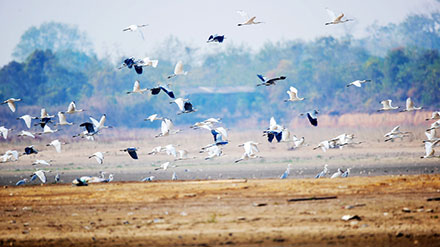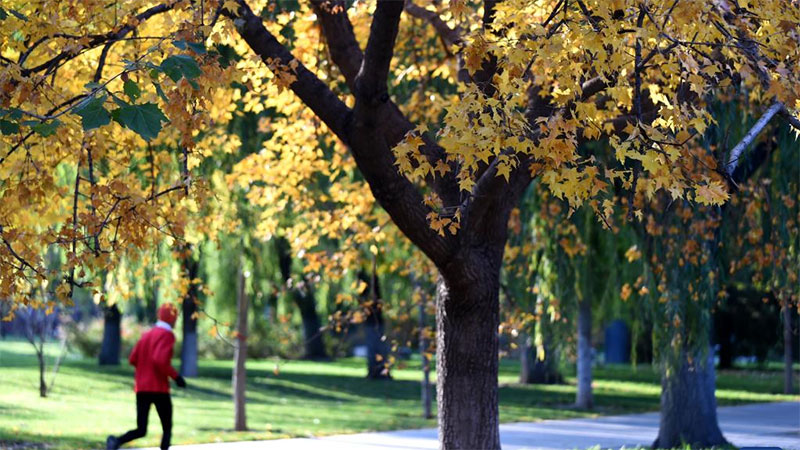Interview: China plays crucial role in wetlands conservation
GENEVA, Nov. 4 (Xinhua) -- As the 14th Meeting of the Conference of the Contracting Parties to the Ramsar Convention on Wetlands (COP14) is about to open Saturday, Musonda Mumba, secretary-general of the Ramsar Convention, said Thursday that China is playing a crucial role in saving and restoring these vital ecosystems.
"What we've seen with the government of China is really absolutely exciting because there's a move and amplification of legislation. They have made sure that over 50 percent of the wetlands in China are under protection in one form or another, be it a national park or a community park," Mumba told Xinhua in a video interview.
The meeting will be held from Nov. 5 to 13, with its main venue in central China's Wuhan city, the official hosts of COP14, and a parallel session in Geneva, Switzerland, in both physical and online formats.
Wetlands are among the most diverse and productive ecosystems as they provide essential services and supply all our fresh water. According to the Convention, an estimated 85 percent have been lost measured against the year 1700.
"Lake Chad, for example, is a lake that is shared between Nigeria, Cameroon, Niger and Chad the country itself. This lake has shrunk to less than 10 percent and is a Ramsar site. It is also a pathway for birdlife species. Indigenous peoples... have depended on this wetland ecosystems for medicine, for food, for fish, but also really the microclimate of this region," Mumba said.
"Our cities are the spaces where more than 50 percent of the world's population by 2050 will be living. This means that we'll be living within either concrete jungles or we will have specific infrastructures that also increase the heating of cities," Mumba said.
"What wetlands do as part of the ecosystem services, and these services are valued at over 47 trillion (U.S.) dollars, is the cooling effect. We can see that having wetlands within cities provides a mechanism of cooling, but also at the same time, an increase of biodiversity and green spaces."
"This is why this COP matters and this is why I think China is really pushing towards this action and calling on all the contracting parties of the convention to act."
The Convention entered into force in China on July 31, 1992. China currently has 64 sites designated as "Wetlands of International Importance" (Ramsar Sites).
With 13 cities, China now has the largest number of wetland cities in the world, and the country has adopted several measures to protect wetlands, including promoting wetland legislation, implementing wetland protection and restoration schemes, designating internationally significant wetlands and carrying out wetland surveys.
"I'm beginning to really believe that it's important when other contracting parties see this leadership why we should invest in these ecosystems and why it's important to make sure that these ecosystems are protected, because the protection also goes for climate change and for biodiversity," Mumba said.
The Convention on Wetlands was adopted on Feb. 2, 1971 in the Iranian city of Ramsar on the shores of the Caspian Sea.
Having 172 contracting parties so far, the intergovernmental treaty provides a framework for national action and international cooperation for the conservation and wise use of wetlands and their resources.
Mumba stressed that strengthening international cooperation was crucial to tackle these vital issues for our planet.
"We're meeting for the first time after the start of the pandemic. We did not meet since 2018. So here we are now meeting together to really look at the state of wetlands and the plight of wetlands, and why wetlands matter and why they're central to our livelihoods collectively as humans on this planet," she said.
The COP14 will be held as the 27th Conference of the Parties of the United Nations Framework Convention on Climate Change (COP27) is to take place on Nov. 6-18 in Sharm El-Sheikh, an Egyptian Red Sea resort city.
The 14th COP meeting is "back-to-back with the climate COP27 and then eventually with the biodiversity COP. What does that mean? That also means that the wetland conversation is happening within the conversations related to climate and biodiversity, really showing the world that all of this is interconnected," said Mumba.
"We're inching closer to the last five years before the end of the agenda of the 2030 Sustainable Development Goals (SDGs). All of this comes very cleanly within legislation and regulatory frameworks," Mumba said.
"SDG 17 is the goal on collaboration and partnerships. We cannot do this alone as the Convention on Wetlands, we need to do this collaboratively with everyone, youth, indigenous peoples, women, politicians, scientists, everyone is a part of this journey to make these spaces much better for both, us and nature alike."
Photos
Related Stories
- In pics: Sungei Buloh Wetland Reserve in Singapore
- China becomes country with most "int'l wetland cities"
- New constructed wetlands can control gaseous emissions: study
- China’s Wuhan to host 14th COP meeting on wetland conservation in November
- Preparations for 14th COP meeting on wetland conservation on track
Copyright © 2022 People's Daily Online. All Rights Reserved.









